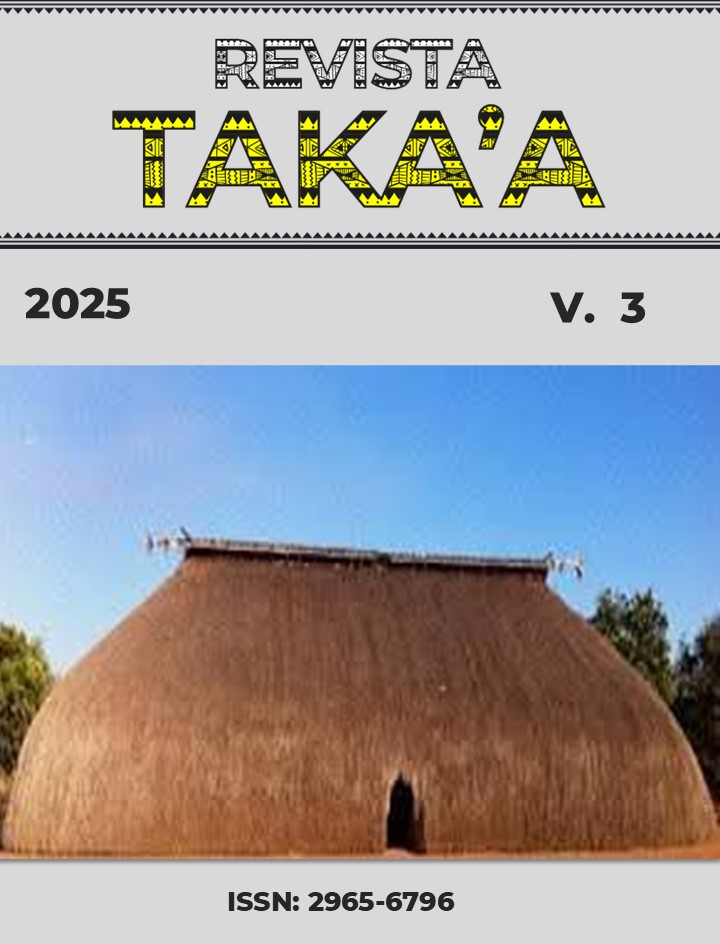Cultural resistance and linguistic innovation in Sateré-Mawé: a record of the neologisms for punctuation marks
DOI:
https://doi.org/10.30681/rtakaa.v3i1.13459Keywords:
Sateré-Mawé language, Neologisms, Punctuation marksAbstract
This article aims to record the process of creating neologisms for punctuation marks in the Sateré-Mawé language. With the adoption of writing and the grammatization of indigenous languages, there is a need for new terms, such as the names of punctuation marks, which are now part of the cultural history of this people. The creation of this terminology was a strategy adopted by Mawé teachers and leaders to strengthen their language and culture. The process took place during the preparation of the pedagogical grammar Sateré-Mawé Pusu Ag͂kukag͂, authored by the teachers of this people. The aim of this report is to share this experience, offering young people and teachers who were not involved in the process the opportunity to learn about the initiative, as well as inspiring other indigenous peoples to value their languages, rejecting the imposition of dominant languages. We present the names created, the strategies used in their elaboration and the context that permeates this process of linguistic resistance.
Downloads
References
ALVES, I. M. Neologismo: criação lexical. São Paulo: Ática, 2007.
ALVES, I. M. O que nos ensinam os estudos sobre a neologia do português brasileiro? Conferência apresentada por Ieda Maria Alves [s.l., s.n], 2020. 1 vídeo (1h 41m 45s). Associação Brasileira de Linguística. Disponível em: https://www.you-tube.com/watch?v=KzC6yyJ_PYg&t=4444s. Acesso em: 21 de julho 2020.
BRASIL. [Constituição (1988)]. Constituição da República Federativa do Brasil de 1988. Brasília, DF: Presidente da República, [2016]. Disponível em: http://www.planalto.gov.br/ccivil_03/constituicao/constituicao.htm. Acesso em 02 fev. 2025.
BOULANGER, J-C. Néologie et terminologie. Néologie en marche, Montreal, série B, Langues de spécialités, n. 4, p. 5-127, 1978.
CORREIA, M.C.; ALMEIDA, G. M. de B. Neologia em português. São Paulo: Parábola Editorial, 2012, 112p.
CYRINO, J.P.L. Como são criadas as palavras novas de uma língua?. In: OTHERO, Gabriel de Ávila; FLORES, Valdir do Nascimento. (Org.). O que sabemos sobre a linguagem. 1. ed.São Paulo: Parábola, 2022. p. 143-148.
FRANCESCHINI, D. do C.; PEIXOTO, V. N. Criação de uma terminologia gramatical em sateré-mawé. In: Anais Eletrônico do 2º CIELLI - Colóquio de Estudos Linguísticos e Literários e 5º CELLI - Colóquio Internacional de Estudos Linguísticos e Literários. Maringá, PR, 2012.
FRANCESCHINI, D. do C. Línguas indígenas e português: contato ou conflito de línguas? Reflexões acerca da situação dos Mawé. In: SILVA, S. S. (Org.). Cenários de bilinguismo no Brasil. Campinas: Pontes, 2011. p. 41-72.
FRANCESCHINI, D. do C. (Org.). Satere-Mawe pusu ag̃kukag̃. Manaus: Editora da Universidade Federal do Amazonas, 2005, 83p.
NEVES, J. G. Cultura escrita em contextos indígenas. 2009.369 f. Tese (Doutorado em Educação Escolar) – Programa de Pós-Graduação de Doutorado em Educação
Escolar da Faculdade de Ciências e Letras da Universidade Estadual Paulista Júlio de Mesquita Filho, Araraquara/SP, 2009.
THIOLLENT, M. Metodologia da pesquisa-ação. São Paulo: Cortez, 1994.
RODRIGUES, A. D. Línguas Brasileiras: Para o conhecimento das Línguas Indígenas. São Paulo: Loyola, 1994. 134 p.








